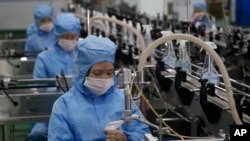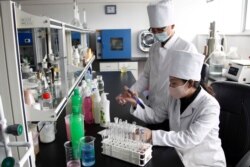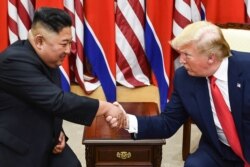North Korea needs to publicly admit there is a coronavirus outbreak inside its borders and officially ask the international community for help fighting COVID-19 before any sanctions are lifted, experts said.
“North Korea has not even acknowledged a single case of coronavirus,” said Christopher Hill, a chief U.S. negotiator with North Korea during the George W. Bush administration. “Until [the North Koreans] acknowledge that they have a problem, I cannot see any relaxation of sanctions.”
North Korea has not publicly reported any confirmed cases of COVID-19. But the regime has taken measures to contain the virus, including putting thousands of people under quarantine and ordering them to follow quarantine rules in an “unconditional and absolute” manner.
North Korea’s all-out efforts against the virus raised speculation that a possible outbreak has occurred in the country that shares a porous border with China, where the virus originated in Wuhan.
The Financial Times reported Thursday that North Korea secretly asked officials from other countries for help. The regime apparently also asked help from international aid organizations with medical supplies needed to fight the virus, according to a report by the Reuters news agency last week.
International aid groups working inside the country have been calling for the waiver of sanctions because shipments of medical supplies have been delayed. The U.N. Security Council imposed sanctions in 2016 that, among other things, limit the country’s import and export of certain goods that could support its nuclear weapons program.
U.N. Secretary-General Antonio Guterres on Tuesday said, “I am encouraging the waiving of sanctions imposed on countries to ensure access to food, essential health supplies and COVID-19 medical support.”
He appealed for the waiver in a letter addressed to the members of the G-20, an international forum at which countries that account for 85 percent of the world’s economy meet for cooperation.
Michelle Bachelet, U.N. high commissioner for human rights, on Tuesday also called for sanctions exemptions to be granted with “flexible authorization for essential medical equipment and supplies.”
However, on Wednesday, U.S. Secretary of State Mike Pompeo said at a news briefing after a virtual meeting he held with G-7 leaders that nations must continue to pressure North Korea.
“The G-7 and all nations must remain united in calling on North Korea to return to negotiations and stay committed to applying diplomatic and economic pressure over its illegal nuclear and ballistic missile programs,” Pompeo said.
Robert King, who served as special envoy for North Korea human rights issues under the Obama administration, said sanctions should not be lifted until Pyongyang is willing to work with the international community.
King said, “If there’s no problem, why do we need to lift sanctions?” He continued, “I think the North Koreans have to be more willing to work with the United Nations and with other countries if they want to receive assistance."
On the contrary, Joseph DeTrani, a former special envoy for nuclear talks with North Korea, thinks the international community should lift sanctions to help North Korea.
“Although North Korea says [it’s] not affected … those sanctions should be lifted,” said DeTrani.
During an interview on The Hugh Hewitt Show on Thursday, Pompeo said the U.S offered assistance for battling the coronavirus to countries like North Korea, Iran and Venezuela.
“In countries like Venezuela — North Korea would be in a similar situation — we’re doing our best to ensure that humanitarian assistance can make its way,” said Pompeo. “In some of these countries, when humanitarian assistance is offered — we have offered assistance for Iran — they’ll often reject it."
In a statement carried by the Korean Central News Agency, North Korea’s official state media, on Sunday, Kim Yo Jong, sister of North Korean leader Kim Jong Un, said U.S. President Donald Trump sent a personal letter offering “anti-epidemic” help.
She has not given any concrete reply to the offer but only welcomed the letter as “a good judgment and proper action for the U.S. president.” She also said it is not good to make a “hasty conclusion” that a close relationship between Trump and Kim could lead to improved relations between the two countries.
Although the two leaders have been exchanging letters, nuclear talks have been deadlocked since October, when the working-level talks in Stockholm collapsed because of their differing demands. Since then, Washington has offered to resume the working-level talks, but Pyongyang has not responded to the offer.
Christy Lee contributed to this report from the VOA Korean service.















